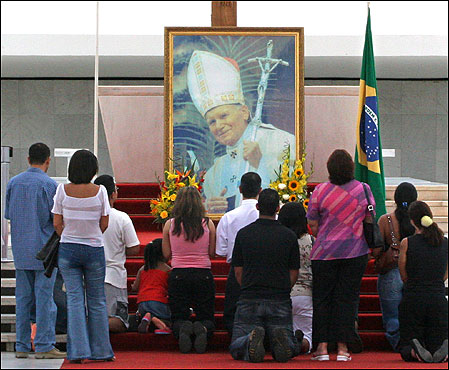You're welcome. I'm satisfied the record of evidence (on my part) and hostility (on your part) is adequate for the most basic reader to comprehend.:2wave:
The most basic reader will comprehend that you omit passages which contradict your beliefs: "The Spirit gives life; the flesh counts for nothing." - John 6:63 ... and will also comprehend that you dodged it altogether.
even the most basic reader will comprehend that you deceive when you stated, "Jesus said that he was the bread of life come down from heaven and that to have eternal life one must LITERALLY eat his flesh and drink his blood. (John 6)" ... and yet, the emphasized word, is your own, not present in John 6.
The most basic reader will comprehend that "the Catholic Church obeys Jesus' command" is an opinion, in light of the fact that the commands are misunderstood.
The most basic reader will comprehend that it would make no sense for Christ to drink his own blood and eat his own flesh.
The most basic reader will comprehend that when you said, "The break with other churches is a scandal and a rift that Catholics pray will heal," and when I later responded to it, you actually accused me of diverting the issue. :roll:
The most basic reader will comprehend that metaphors can still exist even when the speaker doesn't later explain them or clarify them.
The most basic reader will comprehend that Paul uses the non-literal word for eating in 1 Corinthians 11, demonstrating that there isn't anything especially significant about the "literal" word "trogo."
The most basic reader will comprehend that you are playing games when you ask ridiculous questions, such as ... "how can one become guilty of the body and blood of the Lord IF THAT BODY AND BLOOD OF THE LORD IS NOT REALLY THERE?" The most basic reader will comprehend, obviously, that the way it is there, is what is in question, spiritually/symbolically, or literally. this debate is about how, not if.
The most basic reader will comprehend that when I explained how I disagree with how you framed this very debate, that it was in fact, on-topic.
The most basic reader will comprehend that the commission is to "do this in remembrance of me," not "please eat my literally transubstantiated body and drink my literal transubstantiated blood."
The most basic reader will comprehend that if bread were really turning into flesh and wine into blood, then it wouldn't be referred to as a "memorial," (... "do this in remembrance of me" ...) it would instead have been called a real presence.
The most basic reader will comprehend that to say that the word trogo is "always used literally" or can "only be used literally," is false. If it were true, then there would be scientific evidence for the phenomenon of transubstantiation. But alas, there is not. And it is obvious why you do not want to go there. I believe that Christ did not lie.
The most basic reader will comprehend that I actually hadn't "characterized you as if you were being sneaky."
The most basic reader will comprehend that I had already answered the question you asked about the framing of the debate, "What does it reveal?"
The most basic reader will comprehend that depending on the context, "real" and "true" (or even "it is" or "I am") can mean various things.
The most basic reader will comprehend that an absolute statement such as "the Church itself is not heretical in any way," is absurd on its face.
The most basic reader will comprehend that when you ask
me to produce substantive evidence of my "opinion" about something being a metaphor, it's absurd. Evidence for a spiritual metaphor? :lol:
The most basic reader will comprehend that your explanation of the literalness of "trogo" is flawed. you say, "a physical reality is described--NOT a spiritual reality." and yet, gnawing and chewing are no more or less physical realities than eating, planting seeds, herding sheep, catching fish, throwing stones, or washing with water.
The most basic reader will comprehend that "I have a Church with a 2000 year history of scholarship--the Bible itself was codified and maintained by the Catholic Church" is an appeal to authority, a fallacy, and a statement I later directly responded to, when you (again) cried "foul."
Even the most basic reader will comprehend that I "harp on translations" because we are obviously dealing with translated texts.
And lastly, even the most basic reader will comprehend that you so far haven't presented arguments against ALL of these points, only games. lots and lots of games.
do your games and consistent dodging of arguments mean that you cede the debate?

 Normally, we don't step into Private Debates. However, I'm taking this opportunity to remind the both of you that normal forum rules are still in effect. Keep it civil, please, or your debate will be over.
Normally, we don't step into Private Debates. However, I'm taking this opportunity to remind the both of you that normal forum rules are still in effect. Keep it civil, please, or your debate will be over.